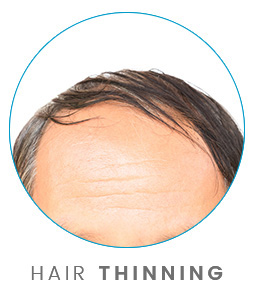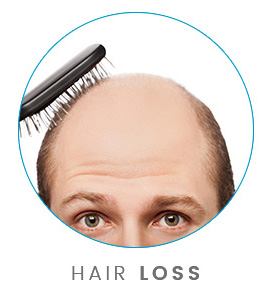Thinning Hair
Thinning means the reduction in the diameter of your hair which makes your hair or crown look scanty. It’s a slow process and you may not suddenly notice the change but you may end up losing a lot of hair before you realise that you’re suffering from thinning hair.
Causes Of Thinning Hair
Although thick, luscious, strong and healthy hair is often promoted as ultimately desirable, it’s an undeniable fact that both men and women are affected by thinning hair. This undesirable condition can be caused by many factors, such as hormones, genetics, stress, and health conditions. Regardless of the source, it runs the risk of being highly distressing and damaging to one’s self-esteem.
Causes of thinning hair in women:
In the case of women, thinning hair can be caused by
- Excessive styling of hair and use of chemical-laden products
- Nutrient deficiencies, like anaemia caused due to iron deficiency, and certain vitamin deficiencies can also lead to thinning hair
- An underactive thyroid
- Temporary hair shedding phase after pregnancy or female pattern baldness
- Skin diseases
- Usage of certain medication
- Hormonal changes and stress
Causes of thinning hair in men:
Thinning hair is caused by a variety of reasons but the most common is male pattern baldness, also known as alopecia areata. It can take a long time for male pattern baldness to create a completely bald look which may be around 20 years or more. Male pattern baldness is one of the biggest thinning hair causes but luckily 20 years is plenty of time to find a hair thinning treatment to suit you. The sooner you get started, the less hair you’ll lose so it can be beneficial to look for supplements, hair thinning products for thinning hair and make some lifestyle changes to fight the genes you’ve been given.
There are some other solid potential reasons for thinning hair too:
Smoking - There are no benefits associated with smoking. It damages your health, your wealth and your hairline. Restricting your arteries with cigarette smoke won’t help oxygen reach your scalp and the toxins affect the hair cells. The result is thin and poor quality hair, so quit smoking to help combat thinning hair.
Medications - Long term medications are often one of the reasons for thinning hair. Medicine either prescribed or over the counter, can produce side effects such as patchy thinning hair or even hair loss. If you think medications might be the reason for thinning hair, see your doctor for advice.
Stress and Worry - We’re all stressed because modern life is a constant battle of work, family time, money worries and problems. If you can’t manage stress then your hair health will suffer, so try some relaxation techniques such as getting a massage, reading a book or taking up a hobby.
Illness and Medical Conditions - There are many illnesses that can cause hair loss. Male pattern baldness itself isn’t an illness but hormone conditions such as a thyroid imbalance, autoimmune disease or testosterone changes can affect your hairline. A temporary infection or stressful situation can also cause hair thinning too.
Difference Between Thinning Hair & Hair Loss
The initial reaction to hair loss is normally shock, surprise or both. So relax! The problem of hair loss is common and happens to so many people around you. There are many effective remedies which you can follow to get rid of this problem.
First, find out the pattern or kind of hair loss you're facing, and depending on which you can plan your hair care. 2 common hair fall patterns among men and women are thinning hair and hair loss. Hair problems start with thinning hair and end at hair loss which leads to baldness.


Here’s a summary of all the basic information that you should know about thinning hair and hair loss, if you’re facing any of these problems.
Thinning Hair
- Thinning hair happens at the initial stage of a hair fall problem.
- Thinning hair doesn't imply you discover baldness one morning. It’s a process where the hair shaft starts to thin with each hair growth cycle.
- The difference between male and female thinning hair is that in the case of men it will usually result in baldness. For women, hair will just become thinner and they won’t usually experience complete baldness.
- During thinning hair, sensitivity to androgen around the hair follicles is common. This sensitivity causes miniaturisation and a change of the diameter of the hair follicle. In women, the process is usually slower, due to the level of ‘follicular protection’ offered by oestrogen.
- Hair thinning is a slow and gradual process and usually doesn't result in complete baldness.
- In thinning hair, the scalp doesn't become visible in a day. The hair loses its lustre and volume and the texture becomes rough. Ultimately, it leads to baldness.
- The possible causes of thinning hair can be pregnancy, stress and anxiety, an excess of Vitamin A, lack of protein, anaemia, thyroid, autoimmune disorders, weight loss or chemical treatments on your hair.
As it's the very initial stage of a hair problem, there are several remedies to help with the problem of hair thinning. The easy to try remedies for thin hair are hair supplements, natural hair care at home, minoxidil or trioxidil and transplant surgery.
Hair Loss
- The advanced stage of thinning hair results in hair fall.
- Hair fall is noticeable as portions of your scalp might become visible and you’ll observe hair strands on your bed, on your clothes, in the bathroom and more.
- Critical hair loss easily leads to baldness in men with age. Though baldness is relatively lesser in women, the problem of hair loss has become a common concern among them.
- Although hair loss is very common and happens to many people, especially as they age, its effects can still be very damaging to confidence levels and can lower self-esteem. Therefore, no matter how common it is, you shouldn’t ignore the signs.
- The sooner you tackle the hair loss problem, the more chance of a full recovery is possible.
- If you’re constantly experiencing hair fall, then it’s hair loss. If you see a few strands of hair for a certain period and then it stops, it may not be hair loss.
- Hair loss treatments take time to show results and you should be patient.
- Once you’re sure that you have a hair loss problem, your only aim should be to protect your hair. Try opting for natural or organic remedies for hair loss that don’t have any known unwanted side effects.
Natural Solutions For Thinning Hair
Here are some thinning hair remedies to consider:
Shampoo For Thinning Hair
Specialist shampoos can thicken up what you’ve got, making your thinning hair appear shinier and boosting its volume. Shampoo treatment for thinning hair gives your scalp and follicles the nutrients they need to promote strong hair growth. Stimulating shampoos contain nutrients that give your follicles a boost and clear out the sebum that can restrict their healthy growth and cause thinning hair. Look out for shampoos that contain natural ingredients to support hair thinning problems and you’ll see an improvement.
Topical Treatments
Topical treatments can boost circulation to the hair follicles so they're one of the best hair products for thin hair. A combination of growth compounds, minerals and vitamins in topical treatments promote thick hair growth.
Supplements
Another good hair thinning product is supplements. These come as pills or capsules and work by supporting the hair’s nutritional needs with natural healthy ingredients because when your hair and follicles are nourished they're more likely to grow better. Nutritional supplement programmes for hair loss work internally to rebuild the foundations that induce healthy, thick hair growth by nourishing the follicles from the root and fighting variables that can cause hair loss. If you struggle to eat a well-balanced diet then a supplement can really help.
Wigs & Hairpieces
Wigs have come a long way since the early days of overly fake toupees that didn’t match your hair colour. However, these wigs can be pricey and you’ll need to shop around for one that suits you.
Hair Fibres
Hair fibres are a great complement or alternative to hair growth creams, supplements and shampoos because they're a temporary cover-up that can be used to great effect. You apply fibres to your scalp from a small applicator that clings to your existing hair, padding out your locks and concealing hair loss with a denser look. This builds up and conceals the bald patches of male pattern baldness, alopecia and female pattern hair loss such as a widened parting or all over thinning. Hair fibres cling to the hair through static charge which means the fibres attach strongly to your hair and look totally natural without any type of glue, pinning or substances that could be noticed. Even if it rains, snows or is windy, because the fibres bind to your hair with static electricity they will stay put.
Tips To Prevent Hair Loss & Hair Thinning
Fortunately, there are many natural home remedies that can help you to prevent hair loss. Some of them are –
- Drinking lots of water and fluids everyday
- Adding green vegetables and fruits into the diet
- Healthy diet with no long gaps of fasting in between
- Hair combing or brushing twice a day
- Reducing use of heat waves on hair from hair dryers or other electronic tools
- Going to bed with tied hair
- Covering hair during a long travel or journey
- Keeping the scalp oil free
- Avoiding combing wet hair
- Using warm or cold water for hair washing
The Final Word
Hair loss or thinning hair can be a nightmare if it starts too early in life. However, once you begin noticing signs of thinning hair or hair loss, switch to gentle and natural products to save you hair from external damage. You’ll also need to tackle this problem from the inside out. Strengthening hair follicles with natural supplements is an alternative that's becoming increasingly popular. So give some TLC to your hair because it’s a crown you never take off!

